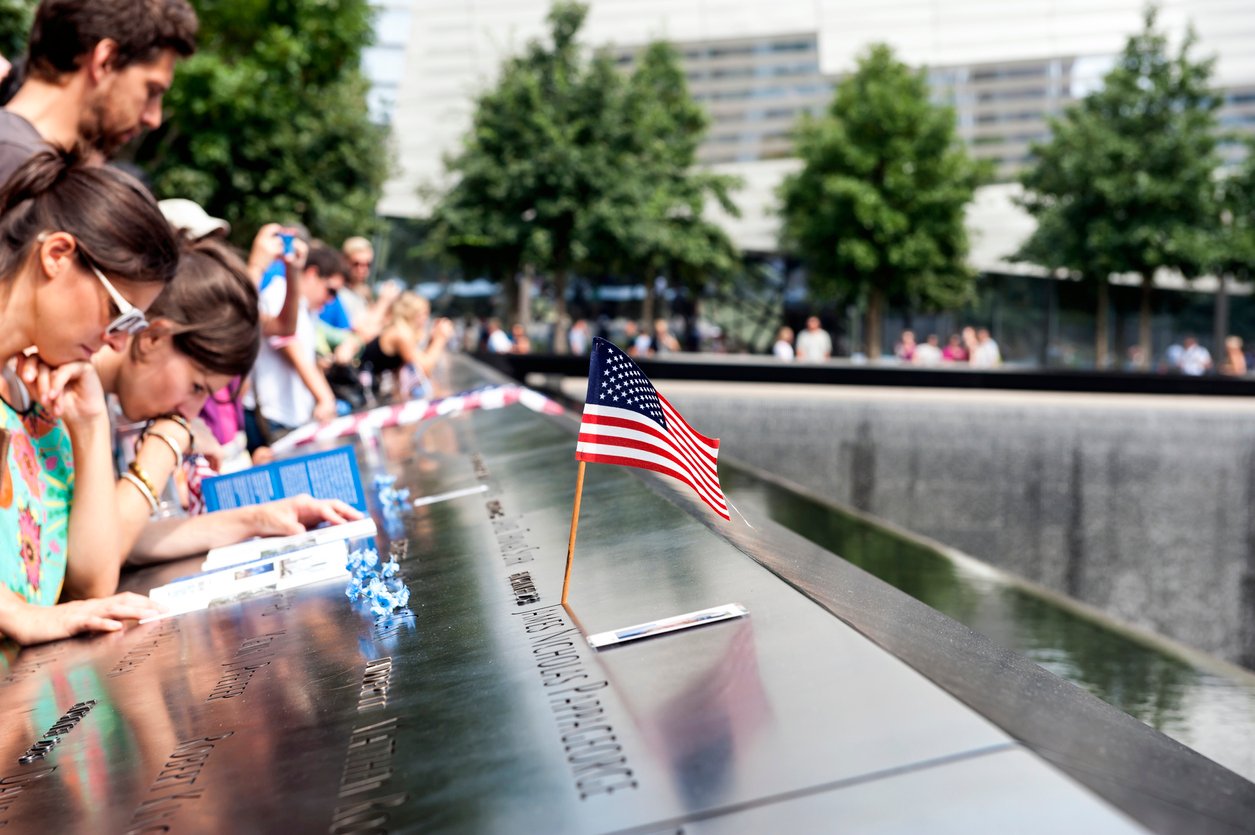From: https://facingtoday.facinghistory.org/6-resources-for-teaching-about-9/11?utm_source=hootsuite&utm_medium=facebook&utm_campaign=organic
6 Resources for Teaching About 9/11
Posted by Mary-Liz Murray on September 7, 2021
 Like many American adults, I can tell you in specific detail where I was on the morning of September 11, 2001 and how the day unfolded as I learned of the terror attacks at the World Trade Center in New York City and the Pentagon. I was about one week into my sophomore year of high school, and in my English class in a classroom with a view of the Boston skyline. Because of the confusion of the day, and the fact that the planes that attacked the Twin Towers took off from Boston’s Logan Airport just 3 miles away, we were dismissed early. I found my younger brother and we walked home, confused and on edge.
Like many American adults, I can tell you in specific detail where I was on the morning of September 11, 2001 and how the day unfolded as I learned of the terror attacks at the World Trade Center in New York City and the Pentagon. I was about one week into my sophomore year of high school, and in my English class in a classroom with a view of the Boston skyline. Because of the confusion of the day, and the fact that the planes that attacked the Twin Towers took off from Boston’s Logan Airport just 3 miles away, we were dismissed early. I found my younger brother and we walked home, confused and on edge.
As I learned more about what had happened, life as I knew it began to change and the U.S. engaged in a new war, leaving me with a lot of questions about what was happening and why. I hadn’t been taught about the global or historical contexts for the attacks. And still, now, with the 20th anniversary of the 9/11 attacks approaching and the tenuous withdrawal crisis in Afghanistan unfolding in disturbing detail, I find myself continuing to search for information and answers on how we got here.
In today’s classroom, there are myriad challenges to addressing and teaching about the attacks of September 11, their place in history, and their continuing impact on our world. Some of those challenges lie with the adults, the educators — and your own knowledge, memories, experiences, and perspectives on what happened and why. Then there’s the challenge of when and how to address it with your class and whether it’s a part of the curriculum you teach or not. Do you talk about it in the moment — near the anniversary? Or later as part of a history or humanities unit? And, of course, at this point, no student in a middle school or high school classroom would even have been alive when the attacks took place. For students today, the attacks themselves are truly—and maybe simply—a terrible event of history.
But the painful legacy of these events and how they’ve shaped the world are evident every day. And young people want to understand more about September 11—not only the events of the day itself, but all that came before and has come after to form the world they live in. Below is a list of resources that can offer you multiple ways to contextualize and teach about what the 20th anniversary of September 11 means. From lessons on memory, legacy, and memorials that may be appropriate to commemorate the anniversary itself, to resources about news literacy, world history, and policy and conflict that could be used at any point in the year, we hope this list can help you answer some of the questions your students (or even you) might have about 9/11 and its legacy.
Resources:
- Analyzing and Creating Memorials — The 20th anniversary of 9/11 offers a chance to explore themes of memory, legacy, and memorial. Consider using this lesson to investigate the different ways memorials are created, why we build them, and how they can shape future generations’ understandings of history.
- Lesson Plans from the 9/11 Memorial and Museum — The 9/11 Memorial and Museum, which was built at the site of the World Trade Center attacks in New York, has an array of educational materials available. These lesson plans, in particular, cover a diverse range of topics related to the events of the day and its immediate aftermath.
- Choices Program | Responding to Terrorism: Challenges for Democracy — This in-depth unit, created for high-schoolers, was originally published in 2011 ahead of the 10th anniversary of the 9/11 attacks, but was updated this summer to account for 10 more years of policy, conflict, extremism, and cultural impact catalyzed by the attacks.
- Afghanistan, the Taliban, Osama bin Laden: The Background to 9/11 and What History Can Teach Us About Contemporary Afghanistan — Paired together, these two scholarly writings can serve as foundational primers for high-school students seeking to understand the global context in which the attacks occurred and how they relate to today’s headlines.
- Stereotypes, Media, and Islamophobia — The 9/11 attacks caused a marked rise in Islamophobia in the United States that persists today. Use this Teaching Idea to help students reflect on how stereotypes—specifically stereotypes about Muslims—can be reinforced through the media we consume and the negative impacts that these stereotypes can have on people’s lives.
- NewseumEd: Covering Catastrophe: Comparing 9/11 Coverage — The events of 9/11 forever changed the way we watch and consume news coverage. This lesson from the Newseum asks students to analyze front page reports about the events, discuss different angles journalists chose to focus on, and investigate if any of the reported details are inaccurate or have since been disproven.
Topics: American History, global terrorism
No comments:
Post a Comment